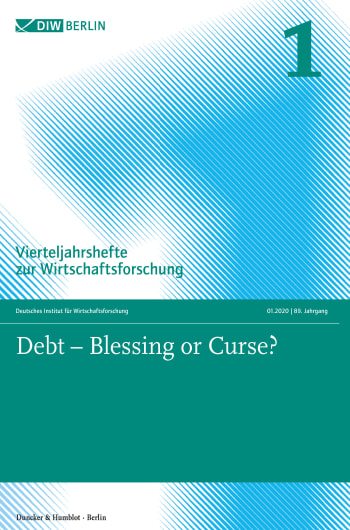Vierteljahrshefte zur Wirtschaftsforschung. Heft 1, 89. Jahrgang (2020)
Beschreibung
Debt is the driving force behind investment, economic growth and prosperity: without debt there would be no interest-bearing assets for savers. Real interest rates are generated by productive investments in the real economy. The current low interest rates point to a savings overhang. The global financial crisis was a crisis of overindebtedness for unproductive investments in worthless financial instruments. Overindebted banks had to reduce debts, reorganise or be rescued by the state. Countries that took on debts for this had to pay higher interest rates, got into a crisis and received new debt through »rescue packages«. At the same time, debt ceilings represent an obstacle to overcoming crises through creditfinanced investments. Similarly at the level of private households: on the one hand, they need loans for productive participation in economic life and for business start-ups; on the other hand, lower-income consumers in particular are exposed to the risk of over-indebtedness. In order to avoid insolvency, they often have to accept expensive rescheduling loans, which further increase their debt burden. The question arises as to what regulatory measures are necessary to prevent irresponsible or usurious lending. Market failures in credit markets, whether through usury, discrimination or speculative exuberance in the pricing of bonds, can be corrected by government intervention to increase welfare.
Two volumes – VJH 4-2019 in German and VJH 1-2020 in English – provide answers to the question »Debt – Blessing or Curse?« and show political options for action. They contain groundbreaking contributions by academics from various disciplines (economics, political science, law, ethics), the German Federal Ministry of Economics and Energy, the jubilee network »erlassjahr.de/Jubilee Germany«, the Centre for Responsible Credit (UK), and the European Business Ethics Network Deutschland. The first volume deals with sovereign debt in Germany, Europe and the Global South, political economy of sovereign debt, Modern Monetary Theory, responsible lending of consumer credit and private sector credit in the euro area. The second volume contains papers on sovereign debt in the euro area, the debt brake in Germany, private debt and financial market sentiment, bank debt and regulation, unsustainable household debt and systemic usury in consumer credit markets.
Inhaltsübersicht
Editorial
Peter Hennecke, Doris Neuberger, and Dorothea Schäfer
Editorial: Debt – Blessing or Curse?
Sovereign Debt
Gabriella Chiesa
Sovereign Debt, the Blessing Aspects and the Implications for the Euro Area
Thomas Lenk, Christian Bender, and Philipp Glinka
The German Debt Brake Approaches for an Improvement of the Technical Design
Private Debt
Korkut Alp Ertürk, and Jake Jennings
Debt and Financial Sentiment. Early Keynes on Balance Sheet Effects of Asset PricenChanges
Giovanni Ferri, and Valerio Pesic
The Spillover Effects of Prudential Regulation on Banking Competition
Damon Gibbons
Unsustainable Household Debt: Problems of Measurement
Doris Neuberger, and Udo Reifner
Systemic Usury and the European Consumer Credit Directive
Authors

